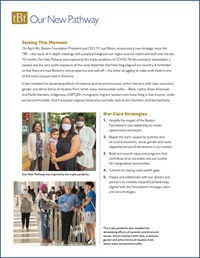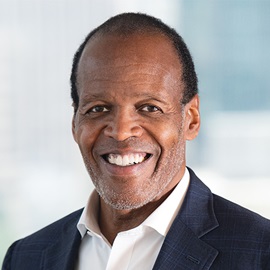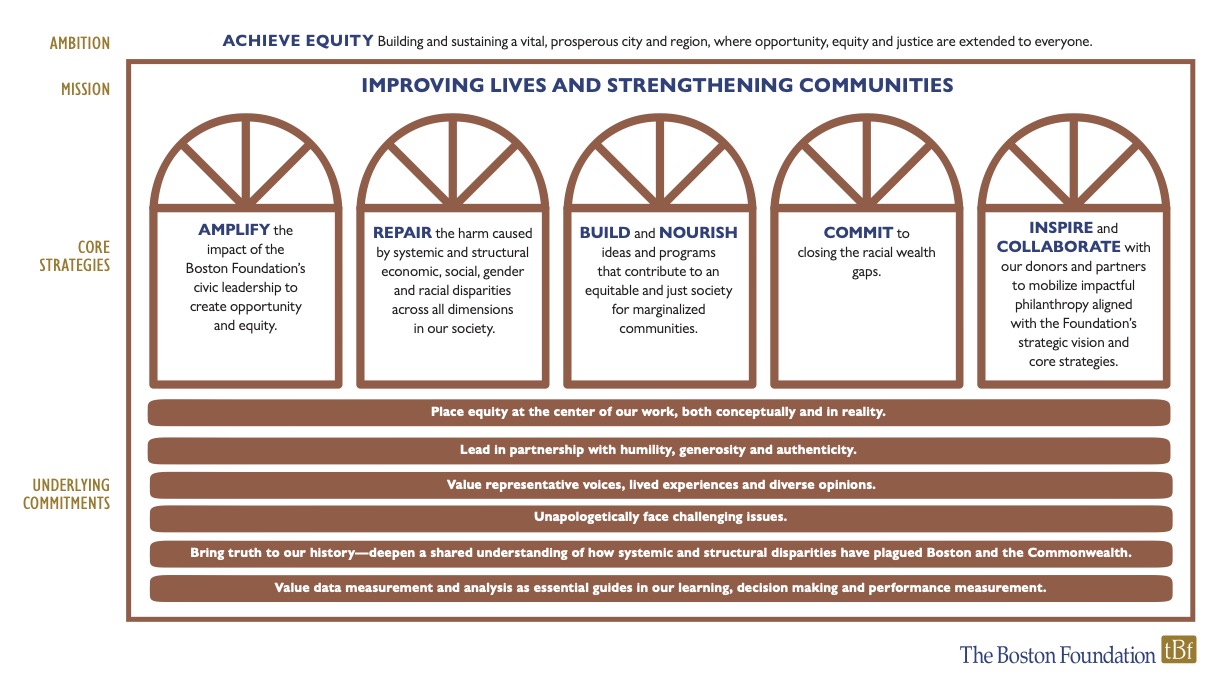While the launch of Our New Pathway is a milestone for the Boston Foundation, it is in fact a working document, a strategic vision that lays out goals and shapes how we will work, rather than a prescription of what we will do. The language and approach are new, but they build upon the work that we already have been doing in partnership with our nonprofit, donor, and community partners. It involves amplifying our civic leadership approach by highlighting key issues, elevating critical voices and supporting public policies and organizations that are committed to advancing equity.
This work requires us all to engage, share questions and ideas, creating a culture of learning that includes rigorously evaluating our strategies so that we know what is working and what is not. The resources and FAQs below serve to provide greater insight and context around Our New Pathway, as together we continue and shape this vital work.
Our New Pathway Resources
One-page overviews
One-page overviews of Our New Pathway are available in multiple languages, including:
English
Espanol (Spanish)
官話 (Mandarin)
kreyòl ayisyen (Haitian Creole)
tiếng Việt (Vietnamese)
The Promise of the Boston Foundation
As part of the planning process, President and CEO Lee Pelton crafted this essay, "The Promise of the Boston Foundation", which provides more insights and context for how we envision Our New Pathway and its place as a natural yet bold evolution in the Foundation's 107-year history.
Frequently Asked Questions
What is the focus of Our New Pathway?
Our New Pathway places equity at the heart of everything the Boston Foundation does. It guides our work to recognize and repair past harms to our community and build new platforms for promoting equity throughout Greater Boston. Much of that work will take shape through TBF’s civic leadership model, which is built on collecting data and commissioning research, convening conversations, developing partnerships or coalitions, and using our shared knowledge to work closely with others to advocate successfully for deep systems change.
What are the specific goals of the New Pathway, and how do they differ from the "underlying commitments?"
Our New Pathway has five core strategies that will shape the Boston Foundation’s work - these are the "what" of our charge. The underlying commitments are the "how". They will guide our thinking and values as we advance these core strategies and will apply to every aspect of our work for Greater Boston.
Our Core Strategies
- Amplify the impact of the Boston Foundation’s civic leadership to create opportunity and equity.
- Repair the harm caused by systemic and structural economic, social, gender and racial disparities across all dimensions in our society.
- Build and nourish ideas and programs that contribute to an equitable and just society for marginalized communities.
- Commit to closing racial wealth gaps.
- Inspire and collaborate with our donors and partners to mobilize impactful philanthropy aligned with the Foundation’s strategic vision and core strategies.
Our Underlying Commitments
- Place equity at the center of our work, both conceptually and in reality.
- Lead in partnership with humility, generosity and authenticity.
- Value representative voices, lived experiences and diverse opinions.
- Unapologetically face challenging issues.
- Bring truth to our history—deepen a shared understanding of how systemic and structural disparities have plagued Boston and the Commonwealth.
- Value data measurement and analysis as essential guides in our learning, decision making and performance measurement.
Our New Pathway Visualized
Another way of looking at Our New Pathway is through this chart design. Our overall ambition of achieving equity brings forward our longtime mission of building and sustaining a vital, prosperous city and region, where opportunity, equity and justice are extended to everyone.
Our core strategies provide the structure of our work, supported throughout by our underlying commitments. The structure of this "meeting house" chart was inspired by the iconic arched windows of Boston's African Meeting House.
FAQs for Nonprofit Partners:
Partnerships with nonprofit organizations we are currently engaged with will continue without interruption. Guided by Our New Pathway, our work may shift to accommodate evolving needs but always with equity as the engine. We are confident that any changes will offer new opportunities to connect with the Foundation’s staff, share feedback and insights with us, and tap into our many resources to inform and inspire nonprofits’ work.
Over the last 10 years, the Boston Foundation’s grantmaking has been grounded in the broad areas of education, health and wellness, jobs and economic development, neighborhoods and housing, and arts and culture. Especially in recent years, however, we have been finding more overlap and have done more work outside of the “silos” of those named areas. For instance, our work on the education front now spans cradle to career, prompting us to ask, is early child care an education issue or a health and wellness issue? Both. Is career training a jobs and economic development issue or an education issue? Both! We have no plans to “abandon” any one of those issue areas, but we know that the lines between them will only blur further as we explore innovative approaches in pursuit of equity across the board. As our grantmaking evolves, we are committed to sharing updates with our partners and remaining responsive to community input.
The Boston Foundation will go further down the path of “trust-based grantmaking”—something we had already begun and which the pandemic accelerated. Conceptually, this means TBF has faith that the people and organizations most closely living with and trying to solve particular problems are the experts best suited to imagine and drive the most promising approaches. In practice, this means the Foundation will be more sensitive to nonprofits’ needs and often limited resources: streamlining our application and contract processes, giving unrestricted and longer-term grants, reducing or simplifying reporting requirements, and in other ways supporting nonprofits so they may use their resources toward their equity-driven missions and spend less of them on doing things for the funder. One might say “fewer strings attached.”
Grants will continue to be made for general operating support as well as for new or special initiatives. As has been our recent practice, TBF’s general discretionary grantmaking will involve research, outreach, and relationship development with nonprofit leaders; special grants programs will remain in effect. Our staff members who work closely with donors will continue and expand their efforts to connect those donors with equity-driven nonprofit partners that inspire their own generous giving.
As it has since 2016, the application-driven Open Door Grants program will continue to aspire to be responsive to nonprofit needs and opportunities throughout the communities we serve. These grants are, as the name implies, open application grants so any nonprofit or community-serving organization with a nonprofit fiscal sponsor that is not aligned with our impact area strategies may apply. As with all the Foundation’s work, we will examine grant proposals through an equity lens. This will entail considering the service or solution a potential Open Door Grant partner would provide along with who is served and who leads the efforts. Any specific adjustments to this or our other application-based grants programs will be shared through our website, programs outreach, and the Nonprofit Update newsletter.
FAQs for donors:
Donors with Donor Advised Funds make grants through their funds in accordance with their own priorities and concerns. While we encourage our donors to follow the work of the Boston Foundation’s civic leadership, they are free to make their own decisions about grants from their own funds. That said, we hope that many of our donors will be inspired by our new emphasis on seeking equity, repairing past harms, and building new platforms to promote a more equitable Greater Boston.
The Boston Foundation does not dictate the focus of grants made from our donors with Donor Advised Funds. We are a community foundation that welcomes donors who have a wide variety of interests and give to nonprofits locally, nationally, and internationally. What’s different for donors will be more opportunities to join the Foundation in learning events, social impact investments, innovative funder/nonprofit coalitions, and celebrations of advancement toward our goals.
The Boston Foundation will continue to raise funds for our critical civic leadership work through the Annual Campaign for Civic Leadership. Monies raised for the ACCL support efforts such as commissioning research, hosting events, convening coalitions, tracking legislation, and helping to shape Greater Boston’s future agenda. We will continue to welcome donors with a wide variety of interests.
Individuals, families and corporations are welcome to establish Donor Advised Funds to pursue their own philanthropic goals. Our donor community includes hundreds of families giving millions of dollars locally, nationally and internationally.
Funders of all sorts are invited to join us in the pursuit of the goals outlined in Our New Pathway.
Definitions and Key Concepts:
How does the Boston Foundation define equity?
At its most basic, equity means fairness. But the Foundation’s view is long and takes history into account to look beyond what may seem “fair” in the narrowness of the present moment. Equity serves as a broad societal goal but also a step-by-step guide for our next daily decision.
In the context of racial and social justice, equity demands that we understand and appreciate how different communities came to be situated as they are and work to allocate resources and energy as needed to create equal opportunities for all community members.
Thus, to achieve equity the structural and underlying causes of outcome disparities must be eliminated for historically marginalized communities. The work toward equity has an explicit, but not exclusive, focus on racism as a root cause of inequality. That root cause often intersects with oppression aimed at other identities.
You talk about civic leadership, and leading in partnership. What does that mean?
In the 21st century, the Boston Foundation has brought forward this concept of civic leadership for a community foundation, seen most often through our careful thought, data-gathering, and analysis; our generosity with our resources (intellectual, fiscal, and logistical); our engagement with other leaders across many circles of influence; our ability to unite diverse people with shared values; and through our boldness in daring to try to make things better.
But we have also learned that none of us can succeed at our work alone. One of the Foundation’s strengths—and what we consider a component of civic leadership—is gathering, inspiring, and rallying others to good causes, such as repairing and building our way toward an equitable society. When we say that the Boston Foundation wants to be a leader in this work, we’re referring to our staunch willingness to partner with other organizations, government, and individuals, believing, as we do, that it is possible both to lead and partner simultaneously.
We have strong perspectives on issues, but approach this work with humility, hope and the promise to undertake an honest appraisal of our own practices, with the knowledge that new structures, programs and policies are best built in league with communities in Greater Boston—not for them.
How does the Boston Foundation define community?
Community is in our most basic description: We are a community foundation, most sharply focused on a specific geographic area.
But that's only one meaning.
We see community as any body of individuals with a shared interest or identity. Within any community, there are countless others. Inside Greater Boston’s AAPI community, for instance, there are about 26 different national origin or language communities, to say nothing of communities based on LGBTQ+ identity, immigration status, profession, age, parenting stage, etc.
Everyone is a member of multiple communities and we recognize and respect that. Because our work of repair will focus most intently on communities that have been maligned, excluded or impeded by systems and practices throughout our country’s history, they will often be what TBF refers to by community. We will make every effort to be clear when using terms with meanings that can be both very broad and very specific.
What does success look like?
One difference between Our New Pathway and many other plans is that we cannot move it forward without partners. We also cannot truly define success without you.
We plan to develop ways to measure our own growth and efforts to make our own practices, decisions, operations and actions more equitable. We hope to make progress in facing and repairing past wrongs, building new programs and initiatives that further equity, supporting organizations doing great work, and changing the perception of Boston so that it is seen by our own residents and those across the country as a city that extends power and agency to increasingly diverse populations.
But specifically what success looks like will emerge over time as we engage with you.



